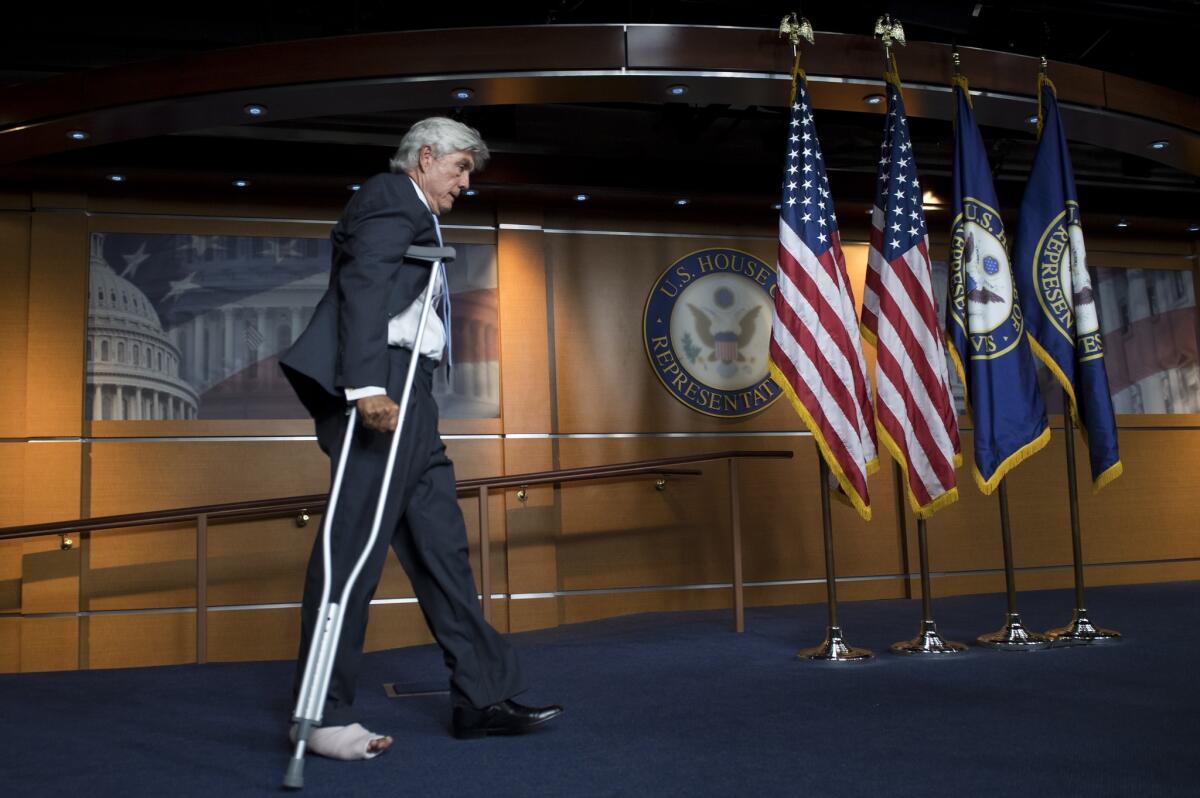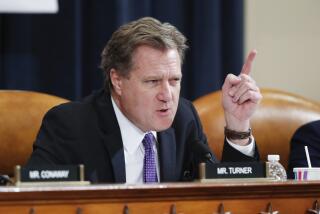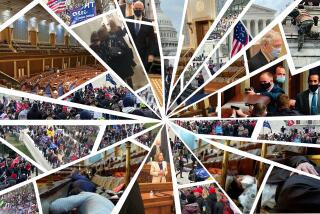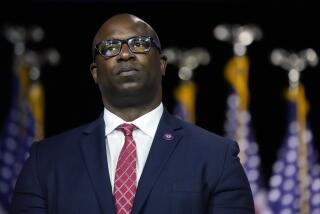Shooting heightens lawmakers’ security fears amid growing partisan rancor

The voice-mail messages left at Arizona Republican Rep. Martha McSally’s office were explicit: “Our sights are set on you. Right between your [expletive] eyes.” Another said, “Your days are numbered.”
A female caller recently warned Rep. Adam Kinzinger (R-Ill.) that he would soon know her name — because she was coming for him.
And after a gunman opened fire Wednesday on Republicans playing baseball — critically wounding Majority Whip Steve Scalise of Louisiana — a staffer of GOP Rep. Claudia Tenney opened the New York congresswoman’s email to find this ominous message: “One down 216 to go.”
As the country’s polarized political environment has intensified since President Trump’s election, members of Congress report receiving more death threats than ever before.
That has led to renewed calls for beefed-up security and other changes to enhance members’ safety, particularly when they travel away from the protective environment of the Capitol. The shooting only added to a growing sense of urgency already felt by lawmakers in both parties, who in recent months have faced unusually loud and belligerent audiences during town hall meetings in their districts.
“The security of members of Congress is embarrassingly inadequate,” said Rep. Cedric L. Richmond (D-La.), who was practicing with the Democratic baseball team some miles away from the Republican team Wednesday morning. Richmond, who as a chairman of the Congressional Black Caucus has received numerous threats, has raised the security issue repeatedly with House leadership of both parties.
“I know it costs money, and I know the American people want us to be as frugal as we can, but there are real costs associated with member security,” he said.
Witnesses have said the attack, in which three others were also shot, would have been much worse had Scalise not been present. As a member of the Republican leadership, he is one of the few lawmakers assigned a security detail, which immediately confronted the gunman until police arrived.
House Speaker Paul D. Ryan (R-Wis.) told lawmakers during a private session on Capitol Hill after the shooting that he was considering their proposals.
Among the ideas being discussed are rule changes that would allow lawmakers to dip into their office stipends to pay for security or expand their ability to use campaign funds for such purposes.
One lawmaker, Rep. Chris Collins (R-N.Y.), an early Trump backer, said on the radio in Buffalo that he would start carrying a gun when he was out and about, despite firearms restrictions in Washington, D.C.
Many lawmakers say they are less concerned about their time in the capital, where they are under the watchful eye of police who patrol the Capitol grounds, than about incidents back home. They worry about protecting thinly staffed district offices that are often simply storefronts in local shopping centers.
Security is expensive, and even the most prominent lawmakers would be hard-pressed to pay for private teams to trail them at events or stake out their homes, where many lawmakers have received personal threats on their families.
At the same time, surrounding themselves with bodyguards and a security perimeter risks alienating constituents who are accustomed open-door policies at district offices and being able to chat up their representatives after a church service.
Congress was back at work Thursday with hearings and votes, but the mood was somber. Wounds were visibly apparent as the baseball team’s coach, Rep. Roger Williams (R-Texas), and his staff member Zachary Barth hobbled on crutches through the halls. Feelings were raw at a morning meeting of House Republicans. Lawmakers of both parties pledged to do better at toning down the rhetoric.
Threats on lawmakers are nothing new; for example, an Elvis impersonator sent an apparently ricin-laced letter to Sen. Roger Wicker (R-Miss.) in 2013, and the next year a bartender suggested spiking the drink of then-House Speaker John A. Boehner (R-Ohio).
But since Trump entered the White House in January, lawmakers say they have received a barrage of emails, Facebook posts, tweets and phone calls threatening them with bodily harm.
McSally, who represents the Tucson-area district where former Democratic Rep. Gabrielle Giffords was shot in the head during a Saturday morning meet-and-greet outside a grocery store in 2011, said she was stunned at the death threats she received in May, particularly for an area so familiar with grief. Six people died in the attack against Giffords.
“It’s not about me; it’s about what’s going on in our country and our community,” McSally said in an interview Thursday. In her case, the caller was swiftly arrested — he told authorities he was angry at the congresswoman for voting in support of Trump.
“My life has been in danger in the past,” said McSally, a former Air Force fighter pilot and the first female to command a fighter squadron in combat. “I was definitely not afraid. But I was also saddened. And just deeply concerned about what I see going on in our society right now.”
Without additional funding, many congressional offices report taking their own precautions.
Staff for Kinzinger, the Illinois Republican, say they are keeping more-detailed logs of the threats that come in almost daily via social media. Some are nonspecific remarks, such as “eat [expletive] and die.” Others, like the caller who warned she was coming to get him, are turned over to police.
Tenney, who took office in January from a centrist district in upstate New York, receives threats “pretty regularly,” her spokeswoman said.
When she participated in a Memorial Day motorcycle ride, one writer on social media expressed hope that Tenney would break her neck. Another hoped her son, a Marine, came home “bagged.” One caller left 70 office voice-mails in a single night, railing on multiple topics.
“It highlights the fact that anonymous people spewing hate on the Internet, elected officials in roles of leadership spewing hate and just a general sense of hate around the country [is] growing,” said Richmond, who was set to be the Democrats’ starting pitcher at Thursday’s ballgame. “It should be a concern to the whole country.”
ALSO
Trump wants a border wall, but few in Congress want to pay for it
With a push from Trump, House Republicans pass Obamacare overhaul
More coverage of politics and the White House
More to Read
Get the L.A. Times Politics newsletter
Deeply reported insights into legislation, politics and policy from Sacramento, Washington and beyond. In your inbox three times per week.
You may occasionally receive promotional content from the Los Angeles Times.







